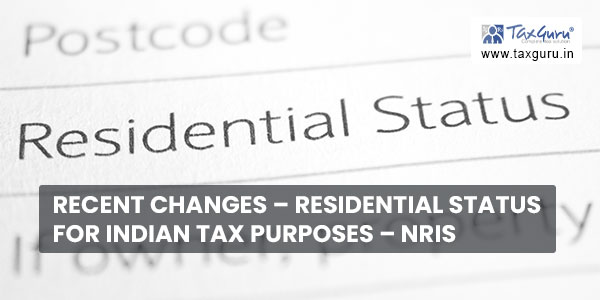Residential Status for Indian Tax Purposes – Individual
The residential status of an individual for tax purposes is crucial for determination of the taxable income. In India, an individual is treated as either “Resident” or “Non-resident” (‘NRs’) for tax purposes. Residents are further classified into “Resident and Ordinary Resident” (‘ROR’)” or “Resident but Not Ordinarily Resident in India” (‘RNOR’). Generally speaking, RORs are subject to tax on their worldwide income whereas NRs and RNORs are subjected to tax on income which accrues or arises in India or is received in India. The residential status is determined for each tax year which is the financial year starting from 1 April – 31 March based on “physical stay” and “citizenship”.
For Non-Resident Indians (Indian citizens or Persons of Indian Origin (‘PIO’) who have been residing outside India), until 31 March 2020, NRIs who visited India could stay in India up to 181 days in a financial year and still could maintain “Non-resident” status in India. The Finance Act, 2020 and the Finance Act 2021 (assented by the President on 28 March 2021) have made far reaching changes regarding the determination of residential status of NRIs for financial year ended 31 March 2021 and 31 March 2022. The objective of this Article is to provide clarity regarding the exact provisions now in force and the implications.

Indian Citizens / PIO (who reside outside India and come to India on a visit)
The residential status for FY 2020-21 and FY 2021-22, which shall be applicable to an individual who is an Indian citizen / PIO and who resides outside India and who comes to India on a visit is summarized below:
| Total Income (Taxable Income) in India (excluding income from foreign sources) | Minimum no. of days stay in India during the relevant year to be considered as ‘Resident in India’ | Residential Status, if stay in India is less than no. of days mentioned in condition (b) | Interpretation
|
| (a) | (b) | (c) | (d) |
| Not exceeding Rs. 1.5 million | 182 days | Non-resident | If total income =< INR 1.5 million, then Indian Citizen or PIO can stay up to 181 days in India to be classified as NR. This is irrespective of whether he is liable to pay tax in any other country or not. |
| Exceeding Rs. 1.5 million | 120 days (and 365 days in last 4 years) | Non-resident / RNOR* | If total income > INR 1.5 million, then Indian Citizen can stay up to 119 days in India to be classified as NR provided he is liable to pay tax in any other country.
In case of Indian Citizen who is not liable to pay tax in any other country, can stay up to 181 days in India to be classified as RNOR. If total income > INR 1.5 million, then PIO can stay up to 119 days in India to be classified as NR. In case the stay exceeds 119 days but is less than 181 days, the status would RNOR. |
* The period of stay in India should be 120 days or more but less than 182 days
“Liable to Tax” defined by Finance Act 2021
The Finance Act, 2021 has defined this term “Liable to tax” in relation to a person and with reference to a country, means that there is an income-tax liability on such person under the law of that country for the time being in force and shall include a person who has subsequently been exempted from such liability under the law of that country.
The above provision has resulted in confusion in case of persons who are residing in Middle East countries which do not impose any income-tax on individuals. As a relief to such NRIs working in such countries, the Central Board of Direct Taxes (CBDT) has issued a press release clarifying that the above provision is an anti-abuse provision and is not intended to tax bonafide workers in foreign countries. It is further clarified that in case a person becomes Resident under this Section 6(1A), no tax will be levied on foreign income unless it is derived from an Indian business or profession.
In most cases, this would not have any direct impact on taxable income in India as the status of such individuals would still be NR or RNOR as discussed earlier and only Indian income shall be continued to be taxable in India and not the worldwide income. However, several Indians who are residing outside India are not comfortable with RNOR status. The provision is also counter-productive as it discourages investments in India in shares and other securities, real estate and other income-yielding instruments resulting in taxable income in India.
Based on the representations made by Non-residents, it is expected that as several non-residents who were struck up in India due to lockdowns and may have become residents or RNORs, a general clarification may be issued by CBDT for exclusion of specified number of days of lockdown for the FY 2020-21.
Authored by: Dr. Suresh Surana, founder, RSM India






i was non resident indian for20_21 21_22 and22_23 a ys am i RNOR?If RNOR whether my salary income from uk taxable or not in24 25 ay?